Hello and welcome back to What China Wants. In today’s episode we revisit the cultural side of China, looking specifically at how Christmas is celebrated there.
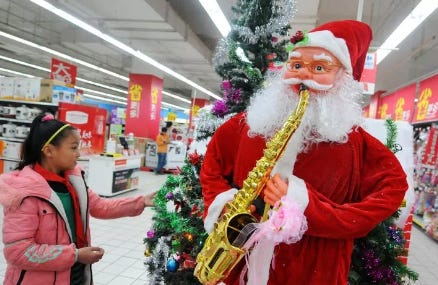
We are joined by friend of the show Andrew Methven, the author of the incredibly interesting substack Slow Chinese, who will guide us through the linguistic and cultural aspects of Christmas in China.
Here is a summary of our discussion:
Christmas is not a national holiday, but it is celebrated. It has been compared to St Patrick’s Day in the West, a carnival-like festival.
The Western Christmas food tradition hasn’t really established itself in China outside of the major international hotels.
Christmas Eve is known as “Silent Night”, a reference to the German carol of the same name.
Father Christmas/Santa fits nicely into Chinese culture because he is old, wise, and dressed in lucky red. But the elves not so much, because in China they are thought of as supernatural beings.
Santa is regularly portrayed as being helped by his sisters, and carrying a saxophone. Andrew explains the reasons behind those interesting cultural motifs.
You can also listen to the podcast on Apple, Amazon, or Spotify.
As always please do share, comment, and subscribe. We’ll be back soon with more What China Wants.
Many thanks for listening, and have a very Happy Christmas.
(In the meantime, if you would like more information about the Evenstar Institute and our research, then please email me sam.olsen@evenstarglobal.com)
***
Here is the transcript:
Sam Olsen: Hello, and welcome back to What China Wants with me, Sam Olsen, and sadly no Stewart today who is off doing something he cannot get out of. But I am very excited to have someone back, a friend of the show, to talk some more about cultural aspects of China. Andrew Methven, for those of you who remember is the author of Slow Chinese, that newsletter on Substack which is doing rather well. It is designed to help learners of Chinese to maintain and improve their language, and also to showcase some of the latest language trends in China. I thoroughly recommend it if you want an amusing insight into the Chinese language every week. Welcome back, Andrew.
Andrew Methven: Sam, thanks for having me back. And yes, it is really great to be back and discuss this interesting and confusing topic of Christmas in China.
SO: Yes, Christmas in China. It is something that I - well, both of us - have had quite a lot of experience in over the years and being in and out of China around that time. It is a great time to be in China because it is so different, and that is what we want to do this podcast. Because if you did a thing about Christmas in Norway (where my dad is from), for example, there are quite a few differences with a British Christmas, but it is not quite alien enough to be of interest for a half an hour podcast. Whereas with China - I think we are going to be able to wring quite a lot of differences out in this particular episode, compared to what everyone thinks in the West.
I suppose to kick things off, Andrew, obviously, even though there are 100 million or so Christians in China now, no one is quite sure the figures. But, out of 1.4 billion, it is not that large, and also Christianity is not anywhere near a state religion in China. It is not a religious holiday, but it is celebrated to some extent. So, the question is for our listeners, Andrew, how do the Chinese celebrate Christmas? What are the main traditions that they have, compared to what we would find familiar?
AM: Okay, well, I think first of all, as you were saying, Sam, it is really different. But I think one of the confusing things is that it looks kind of similar on the surface. So around Christmas time - maybe not this year, because of the lockdown and COVID and what have you - but generally by this time in China, in the big cities, in shopping malls you can see enormous Christmas trees, there are probably armies of Father Christmases around doing stuff, even organised dances and things like that. In offices, especially those that have an international connection, you will have Christmas trees and things like that. So it looks similar to begin with, but maybe a lot more neon, and you might say 'Christmas on steroids'.
But actually, beneath that there are some really interesting differences. In terms of how it is celebrated in China, as you said, it is not a religious holiday first. It is not an official holiday either, so it is not a day off, but it is recognised and celebrated, but in quite a different way. So generally, it is more celebrated or recognised by younger people, so people I would say under the age of 40. I would say it is very commercial, it looks and feels very commercial. So, it is not really a shopping festival now, but I think before Double 11 Shopping Festival, there was definitely a very-
SO: Hang on Andrew, we spoke about Double 11 In our last podcast with you, but our listenership has tripled since then. So a lot of people perhaps will not be familiar with Double 11. Do you want to just quickly say what that is?
AM: Yes, sure. So that is a festival, it happens on the 11th November every year. Well, it is actually a three or four week campaign up to the 11th of November. It is called Singles Day, and it is a shopping festival. I think it was conceived by Alibaba, and it has turned into a huge commercial extravaganza, mostly online, but generally across China around November. It is a huge shopping festival, and I think maybe that has taken a little bit away from how Christmas had been commercialised before. Nonetheless, Christmas is still very much visible in China, particularly among younger people. I have read about it being compared to Valentine's Day or St. Patrick's Day where it is a single day where people go out, have fun, maybe go and eat out or just be out and about. So it is definitely not a family thing, it is not a religious thing. It is really for young people having it as an excuse or as a reason to either go shopping or to go out and socialise.
SO: Got it, and actually we have got a podcast coming up very soon about Chinese food and the relationship, including Christmas, and festivals and should be great fun. But in this specific context, have you ever heard of a Chinese restaurant is doing mass Turkey, or anything Western for Christmas lunch?
AM: I have not been in China during Christmas for years, and also I would caveat that I have not been to China at all for more than three years now. Maybe things have changed over recent years, but normally, in the big cities, you will have the international hotels doing Christmas dinner.
There are some interesting changes to the meal. There is a dish in Chinese called 'eight treasure duck', bābǎoyā. That is a little bit like it, it is a stuffed duck, and it is stuffed with different types of meats, and also sweet fruits as well. That seems to be something that has replaced the turkey. And so, if I were a 30-something Chinese person wanting to go out with my friends on Christmas evening, then I might find myself ordering an 'eight treasure duck' instead of a turkey. So, there is a kind of an equivalent dish, but apart from that, I have not seen any other kind of particular foods that you will eat around Christmas, in China.
SO: What else has been co-opted into making Christmas more Chinese? Are there any other traditions which are which we would not recognise but which are considered nonetheless to be part of Christmas in China?
AM: Yes, so I think and again, interestingly, it is a lot to do with how the language works; the Chinese language works around Christmas, and then how that has influenced how some of the traditions around Christmas have been Sinofied, or China-fied. The first thing is the word for 'Christmas Eve', in Chinese is not really what it should be. So, the translation for 'eve', the word 'eve' is 'qiánxī', meaning the night before. For example, Chinese New Year that's the word qiánxī. But on Christmas, Christmas Eve is 'píngān yè', which translates directly as 'silent' or 'peaceful night'. The reason why it is called that is because of the translation of the Christmas song, Silent Night, Holy Night. So that song is translated as píngān yè.
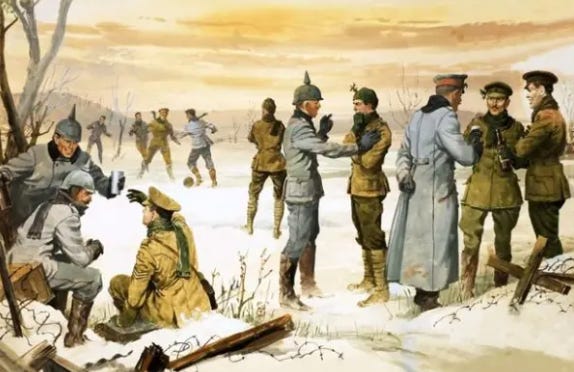
SO: That is good, that is very interesting.
AM: Yes, and so for some reason... and of course, don't forget Silent Night, Holy Night is originally a German song that was written in the 19th century. Obviously, that has come into the English language Christmas tradition, and then it has been translated into Chinese and become part of the Chinese tradition, but in a different way. So Christmas Eve is 'píngān yè', 'peaceful night' or 'peaceful evening'. And because of that, there is a homophone in Chinese, so píng is also the word for apple, 'píngguǒ'. 'Píngān' is 'peace', 'píngguǒ' is 'apple'. So on Christmas Eve, a gift that you would give someone is an apple, or a píngguǒ.
SO: Like a peace apple?
AM: Peace Apple, or píngānguǒ, is one tradition that is very Chinese, and you would not get as part of Christmas elsewhere. So generally, a great gift to give in China at any time is an apple because of the symbolism. And actually, I only recently realised that I think, a píngānguǒ actually has come from the Chinese version of Christmas. But now you can use it more widely, not just as part of Christmas. I think that is one of the big differences. It is interesting because it is purely because of the language and how it was translated in the first place that has then impacted on how you give a gift during Christmas in China. But then you still got the gift giving part of it, it is just quite different. So that that is definitely one of the main differences.
SO: What else is not included in Christmas in China in terms of the language?
AM: What else is not included? Well, first of all, the way you say Happy Christmas in Chinese is a very straightforward translation 'Shèngdàn kuàilè'. 'Shèng' is 'Saint' or kind of 'God', 'dàn' is 'to be born'. 'Shèngdàn jié' is Christmas, so 'saint-born Festival', and then 'Shèngdàn kuàilè'' is how you say 'Happy Christmas'. And that is pretty much a straightforward translation. As I said, the 'píngān yè', the 'peaceful night', Christmas Eve, I think is probably the main difference in terms of language. But then also, it's quite interesting in terms of what is the same. Father Christmas is definitely the main character in Christmas in China 'Shèngdàn lǎorén'. And I think that is because an older person in Chinese culture is generally seen as very respected and wise. So, an elderly white-haired man, you can see that kind of fits culturally, so that has been absorbed.
The colours also work, so red and white. There is a phrase In Chinese, which is 'hóng bái xǐshí', so 'red, white, happy times'. Red is the colour you wear at a wedding in China, white is the colour you wear in a funeral. And so generally, the phrase for everything to do with festivals and important events is described as 'in the colours of red and white'. Father Christmas wears red and white, so you can see how that culturally fits. Father, Christmas is definitely in there, because he fits culturally, both in terms of respect for the older generation, and also the colours that he wears. I think generally, he is just seen on his own, reindeers feature a little bit, as well, Christmas trees are also part of the symbolism. But other than that, I think everything else is quite different, both in terms of as we were saying, who celebrates it, how they celebrate it, that is all very different. Then of course, there are these really confusing parts of it around Father Christmas is sometimes seen with a saxophone...
SO: Now, I was going to ask you about that because that is definitely something which most Westerners would think was slightly incongruous, because Father Christmas and a saxophone is not a usual combination. Is that actually a thing? Or is it just sort of a bit of a joke?
AM: I think it is a thing. I have not really thought about it until I was reading into it more ahead of our discussion, but yes, you will often see not a human Father Christmas, I have not seen many of them (with one), but a statuette of a Father Christmas, you will often see them holding a saxophone, a kind of life size figure. There is no good explanation as to why this is. There are a couple of theories, the main one being that generally during Chinese festivals, there is some kind of musical instrument associated with it. For example, around Chinese New Year, you have got drums or gongs or Chinese instruments.
Therefore, the main character of Christmas in China being Father Christmas, it is not unusual for him to be holding a musical instrument. The saxophone is seen as very much a Western invention, which it is. So, the best theory I have come up with is that, because it is a festival, the main guy involved in the festival needs a musical instrument in China, because that is just how it goes. And because it is a Western import, therefore, he should be holding a Western instrument, and a saxophone seems to be the one that people have decided - maybe because it is more portable than many other instruments. So that is the best theory I've found on why Father Christmas is often seen holding a saxophone in China.
SO: Okay, so that kind of works. There would have been many, many instruments you could have chosen instead, like a guitar or whatever, but saxophone so be it. But here is the question. Why is he also seen with sisters rather than elves? You very, very rarely see or even hear people talking about elves in China, which obviously, Will Ferrell must be a bit annoyed about for his film marketing?
AM: Yes. Again, Sam, this is one of those really annoying questions. Normally when you are researching something on the Chinese internet, Baidu has the answers to everything. But this is one of those questions that there is no good answer for. And so again, I am just coming up with my own theory on this, but I think it could be something to do with language, actually. So the idea of an elf, I think that is a really alien concept in China, and the word for 'elf' in Chinese, which is 'jīnglíng'. It does kind of work in translation but I think it may be it is just too much of an alien concept, to be part of what is absorbed into Christmas in China. And also, you know, a 'jīnglíng', 'an elf' in Chinese, well an elf is a supernatural, not necessarily a ghost, but something that is supernatural. And then within the imagery of Christmas in China, you have got a wise old man who is dressed in red and white. In the Chinese context, you can see that this kind of supernatural being does not really fit with it.
SO: Which is kind of ironic when the whole point is that Father Christmas is a supernatural being in the West, someone that can miraculously go through chimneys and fly through the sky.
AM: Yes, I mean, it is true. So again, this is just my theory, but I think because Father Christmas looks like a kind of wise old man, I think you can kind of get that. And of course, a lot of how China sees Christmas now is very much influenced by the more modern commercialised version of Christmas that we get in the western world as well, and so that is also part of it. But I think the fact that elves are not part of it, and instead Father Christmas apparently has sisters, maybe that is partly to do with how you see, perhaps more in the US, in terms of Santa's helpers often being women dressed in Christmas kind of clothing. Maybe it is just that the elf is a step too far to be absorbed into Chinese Christmas, and actually, they just want to stick with Father Christmas holding a saxophone.
SO: Fair enough, elves are not everyone's cup of tea anyway. So what about, you mentioned about shopping... now, one of the things I remember about being in and around China for Christmas was the sheer excitement about how much could be bought. Also, considering a lot of the people I would have been talking to are businessmen and women selling tat, wondering how much money they could make over the Christmas period. But you said that it has slightly been eclipsed by this new Alibaba phenomenon Double 11. But is Christmas still considered to be a big shopping bonanza? Or is it coalescing into something slightly different from that now you have got the competition with Double 11?
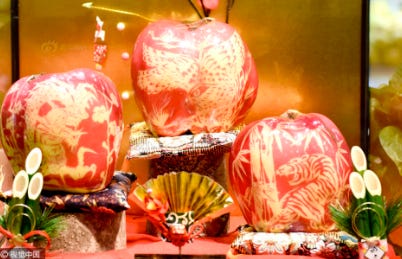
AM: Yes, so I think certainly the shopping festivals in China have definitely, I mean, they have just become so big. I think that is a response to what seems to be this need for people to consume, particularly younger generations, just the level of wanting to buy and shop and stuff. This is definitely a phenomenon of modern China. I think Christmas, I think it's still seen very much as a time to consume, whether that be shopping or going out and having fun, eating out. The word that I have most seen Christmas described as in Chinese is 'kuánghuān', which is a kind of festival or carnival type atmosphere. And actually, I just think there are so many festivals of various sorts in China, I think, generally, culturally, the idea of a festival a 'jiérì', it is just part of the Chinese calendar.
But the way these festivals have manifested in modern China can be quite different. So for example, the two main holidays in China to do with the country, i.e. National Day holiday in October, and the Dragon Boat festival. They are to do with China and the kind of nation, but people look at that now as time to go on holiday, or to go overseas and take a 7-10 day holiday. And so again, that is probably quite different to how people would have celebrated that holiday, 50 or 60 years ago. So I think consumption is just part of modern China, and the shopping festivals that have come about over the last 10 years have definitely overtaken Christmas as being a shopping-type festival in China. But I think there is still a lot of consumerism around it, much as there is here in the UK and elsewhere.
SO: Yes exactly. Consumerism is now a huge part, if not the dominant part, of Christmas in large parts of the West. So, I am not surprised it has gone that way in China. But I suppose just to finish off, what would you say the difference is between Christmas and Chinese New Year are? Obviously, there is a consumerism aspect in both, but what are the similarities and differences?
AM: I think, actually, I would say, in terms of how Christmas is celebrated in the West, there are lots of equivalents of how Chinese New Year is celebrated in China. It is about family coming together. Christmas holiday here, in the UK for me, that week is pretty much every single day, you have got another family home or you are doing something and seeing family and eating, giving gifts, and Chinese New Year is very much like that. Generally, people will try and travel home, when they go to their hometown, maybe they have not been back for a year. So, there is lots of seeing, obviously, parents, but then other relatives. There is a set calendar of the first day in the New Year, you see the grandparents on one side, and the next day, you see the grandparents on the other side. So, it is all about visiting family.
I think actually, for the younger generation in China, it can often be quite stressful, because they will be asked about, are they married yet? How much money are they making? What does the future hold? So actually, Christmas, therefore, can be seen as a bit of a release in China, because it is not about family. It is just about having fun, going out and either having a meal or going shopping. So, I think there are parallels between how Christmas is celebrated in the West and how Chinese New Year is celebrated in China. But then, of course, you have high levels of consumerism in China around Chinese New Year, as you do around Christmas in the West. So, I would say actually, those two they are quite similar in many ways, but just the version of Christmas in China is very different to Chinese New Year.
SO: Good. Well, on that note, I suppose it is best to say 'shèngdàn kuàilè' and to wish all our listeners a very happy Christmas and thanks again for coming on. It is always good to look at Chinese culture through language, and I hope people have learned a fair bit about the differences and a few of the similarities as well.
AM: Thanks so much for having me, Sam, it is great to be here. And yes, Happy Christmas. I look forward to seeing in the new year
SO: And check out Slow Chinese if you have not already. We will be in touch with you next year. Thanks so much, Andrew, all the best.
AM: Alright, thanks Sam.






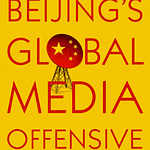
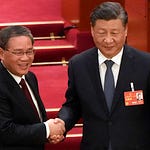
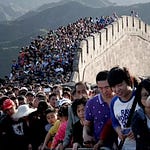
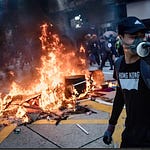


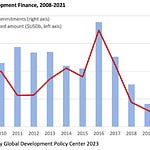
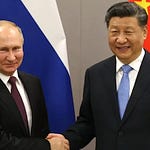
Episode 31: How Does China Celebrate Christmas?